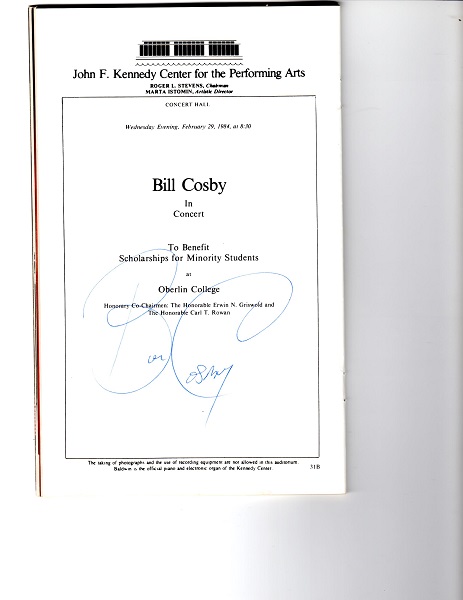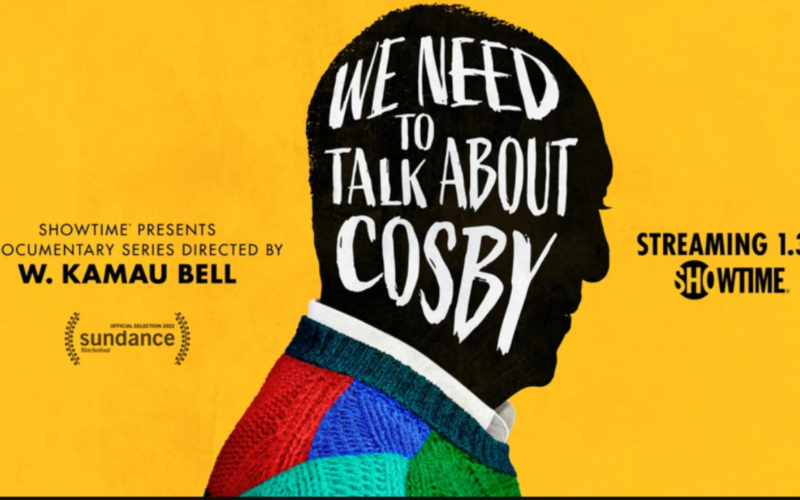We Need to Talk About Cosby (Bell, 2022)
Can a film be simultaneously essential and disappointing?
I ask because I feel like we do need to talk about Cosby — or at least I do. But while the title promises a dialogue that examines and interprets the meaning of Bill Cosby’s criminal conviction (and eventual release from prison), the four-part documentary is far more summative.
More than half of the four one-hour episodes are about context — why the Cosby story is culturally relevant. But while context is always welcome, it is more welcome when it is a foundation for substantive analysis rather than a substitute for it. For example, it is not until the fifty-five-minute mark of the fourth episode, roughly when the documentary is 98% done, that the question of whether it is possible to bracket an artist’s work from his personal life is even phrased. In a clip from an interview, Jerry Seinfeld says “yes” and Stephen Colbert says “no.” And there is no follow-up. Telling us what the questions raised by Cosby’s scandal are is not the same thing as wrestling with them.
It is true that the sheer length of the documentary has a power of its own. Volume substitutes for depth. In this regard, the documentary appears to be following in the footsteps of O.J.: Made in America, another series that used the story of one man to take a broader look at the history and issues of race in his time. And I’ll be honest, some of that history is interesting and interestingly presented.
At its core, however, the documentary is more interested in chronicling what happened than analyzing why it happened or what it meant.
What happened — at least according to a string of damningly familiar testimony — is that Cosby sexually assaulted and/or raped dozens of women. The documentary is at its best when it lets them speak in their own words, and the pattern of the portrait they paint is distressing for anyone who grew up admiring or enjoying the famous comedian.
I supposed one important insight that the summary provided is that the pattern of behavior was present from the beginnings of Cosby’s career. Because the public scrutiny came late (even after some initial accusations were levied), there may be a temptation to think that Cosby changed as he aged and look for answers to the question of what prompted that change. But the film’s position is that Cosby is who he always was, and that raises a whole slew of other, more difficult questions that are raised but not fully addressed: why did he get away with it for so long? who knew and how much? why do (some of us) still laugh at jokes about rape culture? why did we ever?

I grew up listening endlessly to Cosby’s albums, practically memorizing “To Russell, My Brother…” One of my fondest high school memories was attending a concern he gave at the Kennedy Center to benefit minority scholarships at Oberlin. My friend and I waited by the stage door for an hour after the show, told by the guard that he might not exit the building that way. When he did, he graciously sat for five minutes, signed both our programs, and sent us home ecstatic. I even remember being impressed that he came out with a woman and a boy in a wheelchair, assuming he had spent the intervening hour paying attention to another boy after the show. But in the intervening years, I’ve wondered more about the woman. I don’t presume that every woman Bill Cosby ever met was sexually assaulted, but over sixty have come forward, and…that’s a lot.
I still have that program, but it means something different to me now. I pull it out and look at it from time to time and reflect on difficult questions. How do we balance a man’s misdeeds with the pleasures he has given us? How many women that I have known or encountered in my adult life have had to choke on their rage as they watched me (or others) lionize their predators? Is there such a thing as a statute of limitations in the moral range? These are all questions I wanted to think about, and I wanted the documentary to help me process. That it didn’t is not necessarily an indictment of the film. It is still a valuable document about a tragic piece of cultural history
I was hoping it would be more — a road map for how to move forward or a syllabus for how to learn lessons from the past in the hope the future might be better. Current politics and social scandals suggest, at least to me, that we haven’t made much progress in the ways we deal with, think about, or talk about sexual assault and rape. Perhaps it is enough that we start by owning how we have dealt with it poorly in the past, though that would necessitate that we not only talk about Cosby but about ourselves and our responses to him. Some participants of the documentary do so, including one who explains why he had a hard time believing the women and what finally changed. There are some moments of indisputable pathos in a series that is overall uneven. Those moments make the documentary worth watching.
We Need to Talk About Cosby will stream on Showtime beginning February 1, 2022.

